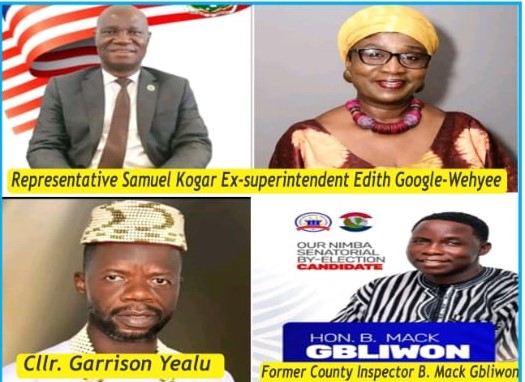The Nimba Senatorial By-Election: A Crucible of Political Transformation
The impending senatorial by-election in Nimba County, slated for Tuesday, April 22, 2025, is poised to be a pivotal political contest, triggered by the demise of Senator Prince Yormie Johnson. Johnson’s enduring influence in Nimba stemmed from his populist rhetoric, strong appeal among the Gio and Mano ethnic groups, and his pivotal role as a kingmaker in past national elections. This election will be a critical juncture for Nimba County: will it adhere to Johnson’s political legacy or embrace a more reformist, technocratic trajectory? With seven prominent candidates vying for the seat, the race is expected to be fiercely competitive and closely monitored throughout Liberia.
The candidates represent a diverse spectrum of political backgrounds and platforms. Madam Edith Gongloe-Weh, a former Superintendent of Nimba and a three-time senatorial contender, is widely respected for her integrity and public service. She enjoys substantial support from women, youth, civil society organizations, and urban voters, and is viewed as a clean, reform-oriented alternative to the established political elite. However, she faces the challenge of mobilizing high voter turnout in key urban centers and winning over rural voters who remain loyal to Prince Johnson’s legacy. Rep. R. Martenokay Tingban, a former Representative of District #9, possesses deep roots in lower Nimba and strong connections to traditional political structures. His experience in legislative and local governance provides a solid foundation, but his appeal among younger, change-seeking voters may be limited. Wonokay Farngalo, a former Deputy Finance Minister and development expert, offers technocratic credentials and expertise in public finance, likely attracting support from professionals and the business sector. However, his low name recognition and limited rural reach pose significant hurdles.
Rep. Samuel Kogar, the incumbent Representative from District #5, is known for his assertive style and grassroots presence. He commands a strong base in Gbehlay-Geh and surrounding areas, bolstered by a robust ground game with loyal district supporters and youth outreach. However, his challenge lies in expanding his appeal beyond his core constituency and mitigating the risk of vote-splitting with other candidates from central Nimba. Cllr. Garrison Yealue, a legal professional and former Governance Commission Chair, projects a reformist image that resonates with educated voters and religious communities. However, his limited grassroots structure could hinder his campaign’s effectiveness. Mack Gbliwon, a businessman and first-time candidate, offers an outsider’s perspective in a field of seasoned politicians but lacks name recognition and the political machinery for a serious challenge. Dr. George Gonpu, an educator and policy expert, focuses on education and development, appealing to academia and younger, progressive voters. However, his minimal political infrastructure limits his potential impact.
The electoral dynamics in Nimba are complex and multifaceted. The Gio and Mano ethnic groups remain crucial voting blocs, and candidates who successfully forge alliances with traditional elders and community leaders in rural areas will hold a significant advantage. Urban centers like Ganta and Sanniquellie are expected to favor reform-minded candidates like Gongloe-Weh, Farngalo, and Yealue, while rural strongholds may lean towards established figures like Kogar and Tingban or candidates endorsed by remnants of Prince Johnson’s movement. Voter turnout will be a decisive factor in this fragmented field. High turnout in urban areas could propel reformists to the forefront, while lower turnout may benefit candidates with well-established rural networks and loyal voter bases.
Among the leading contenders, Edith Gongloe-Weh is well-positioned to win if she can consolidate urban and youth support, capitalizing on her reformist image and name recognition. Rep. Samuel Kogar represents a formidable challenger due to his grassroots strength in rural areas, especially if he can broaden his appeal beyond his home turf. R. Martenokay Tingban, with his quiet influence among older voters and traditional structures, remains a significant force in the race. Farngalo and Yealue could sway the outcome by attracting undecided and educated urban voters, though they risk splitting the reform vote. Dr. Gonpu and Gbliwon, while unlikely to win, could play spoiler roles in closely contested districts.
High-profile endorsements add another layer of complexity to the race. Former President Ellen Johnson Sirleaf and former Vice President Jewel Howard-Taylor are leading a coalition of women in support of Madam Edith Gongloe-Weh, further bolstering her profile and appeal among female voters. Former Presidential candidate and political leader of the Alternative National Congress, Alexander Cummings, has also thrown his weight behind Gongloe-Weh, adding to the momentum of her campaign. On the other side of the political spectrum, former President George Weah is actively campaigning for the CDC candidate, although reports of divided support within the party could impact their performance. Incumbent President Boakai and his Vice President are also on the ground in Nimba, rallying support for Rep. Samuel Kogar, leveraging the influence of the current administration. These high-level endorsements underscore the national significance of the Nimba by-election and its potential ramifications for the broader political landscape in Liberia.
The Nimba senatorial by-election is not merely a contest for a single seat; it represents a broader struggle for the political soul of the county. The outcome will signal whether Nimba chooses to continue along the path charted by Prince Johnson or embrace a new direction, potentially ushering in an era of reform and technocratic leadership. The election also serves as a litmus test for the strength and influence of various political factions and alliances, with implications for the upcoming 2027 general elections. The eyes of the nation are on Nimba, as this by-election could significantly reshape the political landscape and set the stage for future political developments in Liberia.














